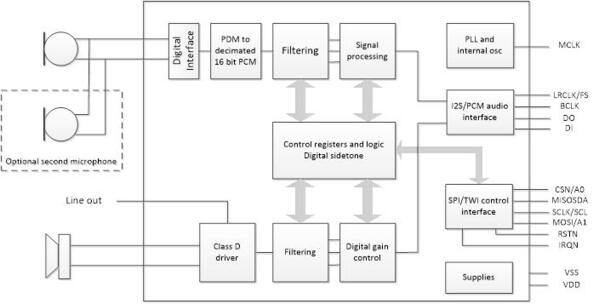Product Description
Traditionally audio codecs have interfaced to electret microphones and speakers providing A-to-D and D-to-A functions using precision oversampling data converters. Recent advances in microphone design using MEMS techniques are now changing this, along with higher efficiency speaker drivers such as Class-D topologies. Both of these advances enable significant reductions in power consumption which is needed to address new applications such as voice control, that require always-on operation. Such applications are often battery powered, driving the need for minimal power consumption. The CMX655D addresses these needs providing an update to the traditional audio codec that is both very low power and small in size.
The CMX655D has a digital microphone interface that connects single or dual microphones to the device and the same parallel processing streams.
A 1-Watt mono Class-D amplifier drives differential audio outputs for a filterless speaker. A separate single-ended analogue lineout is also provided for a headphone. The Class-D amplifier features programmable filtering and digital gain control. This architecture operates with far higher efficiency than conventional speaker drivers.
The device interfaces via standard serial busses that are commonly found on many microcontrollers, DSPs and low cost radio transceivers.
Features
- Digital microphone support
- High efficiency Class-D amplifier
- Ultra Low power consumption
- Ultra Low power consumption
- 16 bit audio data
- Supports conventional telephony and HD voice (300Hz - 3.4kHz and 50Hz -7kHz bandwidths)
- Supports audio bandwidths up to 21kHz
- Supports 8/16/32/48 ksps sample rates
- Flexible serial audio interface
- SPI/TWI control interface1
| Voltage: | 2.7 to 3.6 VDC |
|---|---|
| Form factor: | 24-pin VQFN |
| Temperature: | -40 to +85 °C |
| Dimensions: | 4.0 x 4.0 x 0.9 mm |
| Current: | 9 mA |
| Packaging: | Tray |
| Reference Frequency Input: | 0.008 to 80 MHz |
| On-Chip PLL: | yes |
| On-chip VCO: | yes |
| Duplex Mode: | Full Duplex |
| Signal IO format: | Digital MEMS in / I2S out I2S in / Class D out |
| Input Bandwidth: | 10 to 21000 Hz (48ks/s) |
| C-BUS (SPI) Control Interface: | yes |

